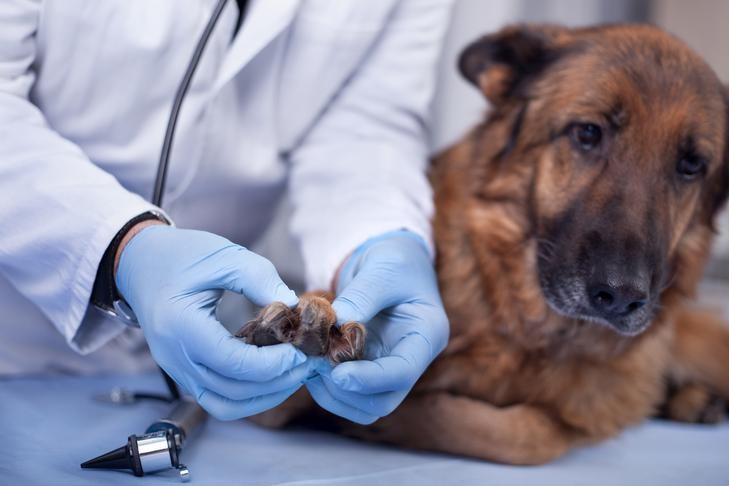Excessive paw licking in dogs can be a common and frustrating problem for pet owners. While occasional licking is normal for grooming, frequent and intense licking often signals an underlying issue. Understanding the potential causes can help you address your dog’s discomfort and ensure their well-being.
Common Reasons for Excessive Paw Licking
Several factors can contribute to a dog’s persistent paw licking. These include:
Injuries
A sudden onset of intense licking, especially focused on one paw, may indicate an injury. Carefully examine the paw for cuts, torn nails, growths, or foreign objects lodged between the pads. Irritants like sharp objects, hot pavement, salt, bee stings, or blisters can also cause discomfort. Simple first-aid might suffice for minor issues, while more serious injuries require veterinary attention.
Dermatitis
If no visible injury is present, dermatitis, or skin inflammation, could be the culprit. This can result from bacterial infections, allergies, or food sensitivities. Allergies to environmental factors like yard chemicals, deicing products, grass, or weeds are also possible. Regularly cleaning your dog’s paws after walks can help minimize exposure to irritants.
Parasites
Fleas and mange mites can cause intense itching, leading to excessive licking. Veterinarians can recommend effective treatments to eliminate these parasites and alleviate the discomfort.
Food Allergies
Itchy paws can be a symptom of food allergies, which are often challenging to diagnose. Your veterinarian may suggest a special diet or an elimination trial to identify and remove the offending ingredients from your dog’s food.
Pain
Pain from arthritis or other conditions affecting the feet or legs can trigger paw licking. Sometimes, dogs lick their paws to cope with pain elsewhere in their body. Veterinary diagnosis and treatment are crucial in these cases.
Behavioral Issues
If physical causes are ruled out, boredom or anxiety might be the underlying reason. Compulsive behaviors, including paw licking, can develop in some dogs. Increased exercise, playtime, puzzle toys, and safe chew toys can help alleviate boredom. For anxiety related to noise phobias or separation, calming treats and consulting an animal behaviorist can be beneficial.
Secondary Infections and When to Seek Veterinary Help
Persistent licking can create a moist environment, leading to secondary bacterial or yeast infections. These infections further exacerbate itching and inflammation. It’s essential to consult your veterinarian to determine the cause of the licking and obtain appropriate treatment. They may prescribe anti-itch sprays, steroids, antibiotics, or antifungals depending on the diagnosis. Addressing the problem promptly can prevent complications and improve your dog’s comfort. Early intervention is key to resolving the underlying issue and preventing a cycle of licking and infection.

